For a moment, George Floyd's murder changed everything. Those days are gone.
Every time a Black person is killed by police, Minneapolis native Alicia Crudup thinks about her boys.
The 42-year-old is a married mother of six sons, ranging from age 11 to 21. She runs a non-profit aimed at mentoring kids in need of support and partnering them with adult role models in the community.
When George Floyd was killed, on May 25 2020, during America’s coronavirus lockdown, Crudup remembers a downpour of commitments too numerous to count.
Fortune 500 corporations were making gigantic financial pledges and tiny arts groups were hired to install Black Lives Matter murals on public spaces, all vowing that this tragedy represented a spark to eliminate racial disparities.
"There was an opportunity here and across the country to enact change in many areas, long-lasting change," Crudup told USA TODAY. But "I feel like we really missed an opportunity to do that. … All of the talk was really just that ? a lot of talk."
Now instead of historic achievements, she lists more setbacks. That fatigue and frustration is being echoed by dozens of voters, community activists, civil rights leaders, scholars and elected officials who spoke with USA TODAY four years after Floyd was suffocated by a white officer's knee to the neck.
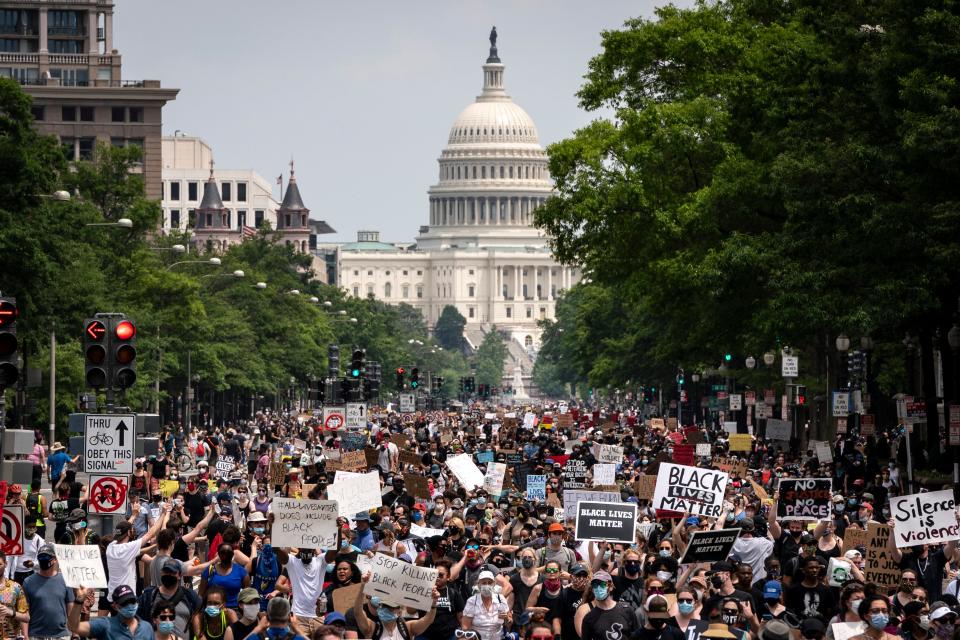
They say the legacy of Floyd's murder is an example of more than a resistance to police accountability, but a larger and sophisticated backlash movement that quashes any attempts at racial justice.
"I have mixed emotions because I hear from some who remain committed. I hear from others deafening silence," said Marc Morial, president and chief executive officer of the National Urban League.
"I see evidence of backlash in many quarters, and I feel in many parts of Black America the idea is, 'here we go again.'"
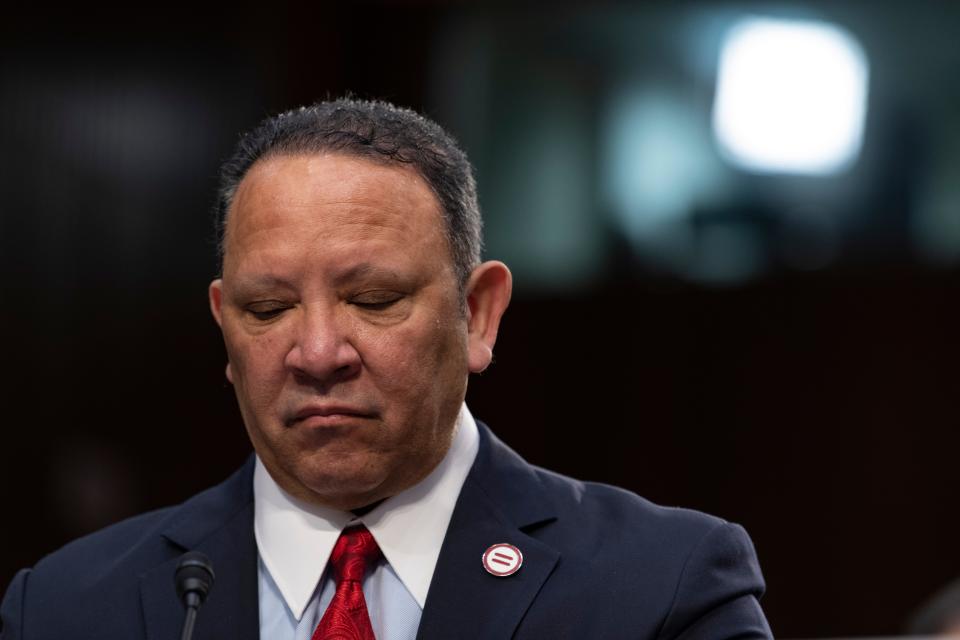
The counteractions over the past four years are widespread, observers say, such as the Supreme Court knocking down affirmative action admissions policies used to diversify college campuses; Republican-led legislatures stamping out Black history courses in public education; and extinguished diversity, equity and inclusion (DEI).
Even symbolic wins aren't safe, experts say, highlighting opposition to "Lift Every Voice and Sing" ? often referred to as the Black national anthem being sung at sporting events, to a Virginia school board this month moving to restore the names of Confederate leaders to two local schools.
And last year, the police killed more Americans than any other year on record.
Jason Williams, an associate professor of justice studies at Montclair State University in New Jersey, said there’s been a "very major backlash" in the wake of Floyd’s death.
"I think ground zero for that project is our colleges and universities where entire DEI departments have been dispersed," Williams said.
The failure of Congress to pass a sweeping reform package in 2021, dubbed the George Floyd Justice in Policing Act, spurred candidates and elected officials to use “cultural politics as a political football,” Williams said, which is almost certain to bleed into the 2024 presidential contest.
"This sort of repression against the George Floyd effort is on steroids, especially now considering that we're in an election cycle where the GOP is using that very movement as part of the ammo to their base," he said.
But amid widespread pessimism some police reform advocates point to flickering progress. Those still in the trenches say efforts to establish alternative public safety models at the local and state level underscores that Floyd's ghastly death was not completely in vain.
A 'very sad day' gobbled up by Washington's inaction
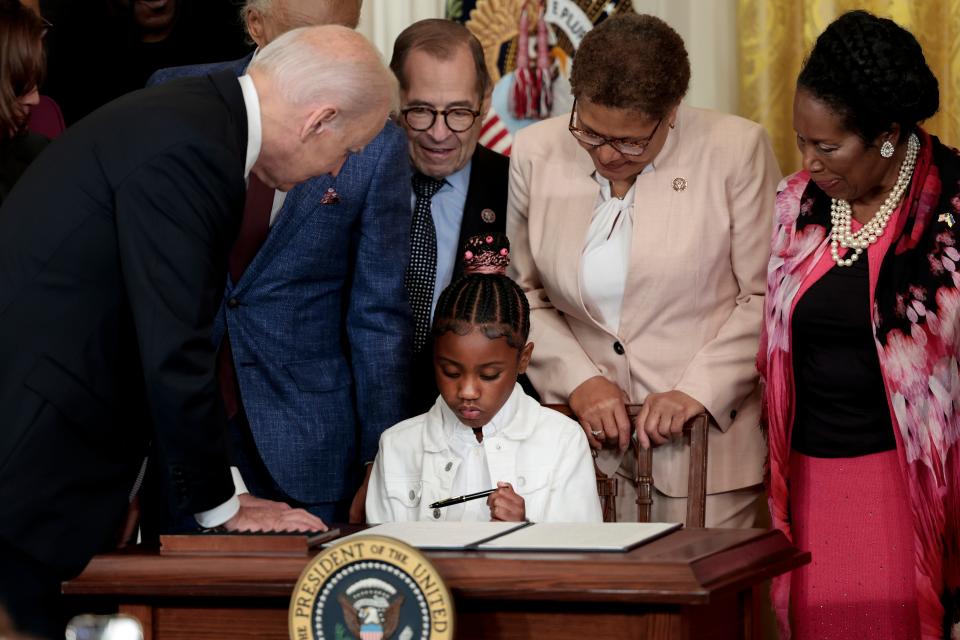
In the immediate aftermath of the viral video showing Minneapolis Police Officer Derek Chauvin kneeling on Floyd's neck for 9 minutes 29 seconds, according to state prosecutors, Washington appeared ready to unclench its partisan fists.
Former President Donald Trump, who rarely criticized police action, called it a "very sad event" in a May 27, 2020 tweet. "Justice will be served," he said.
Fifty-eight percent of Americans polled in a July 2020 Gallup survey said policing needed "major changes." Another 36% said at least minor changes were required versus just 6% who said the country should do nothing.
Even after Trump lost reelection, there was a bipartisan commitment with Sens. Tim Scott, R-S.C., and Cory Booker, D-N.J., launching a year-long quest to draft a police reform bill that the Senate could agree upon. That eventually foundered under irreconcilable differences and changing political winds.
Booker said he will continue to press for more support to pass federal legislation.
"While the call for reform was distorted to score political points, the facts remain the same," Booker said in a statement to USA TODAY. "We must pursue police reforms that enhance public safety and also improve transparency, accountability and justice."
Neither Scott nor his office responded to USA TODAY's request for comment. Scott spent much of his short-lived run for president downplaying racism in the United States.
Led by a fiercely right-wing counter-movement, Floyd's image was recast from victim to a boogeyman embodying the social ills some associate with America's cities. His death, GOP critics said, paved the way for looting and violence led by left-wing radicals.
That sentiment remains prevalent among conservative lawmakers on Capitol Hill today, who argue Americans are more focused on crime.
Police officers, these members say, have been the ones mistreated and targeted by violence since 2020.
"I hate that our entire police force is connected to George Floyd all the time," Rep. Lauren Boebert, R-Colorado, said in a recent interview outside the U.S. Capitol.
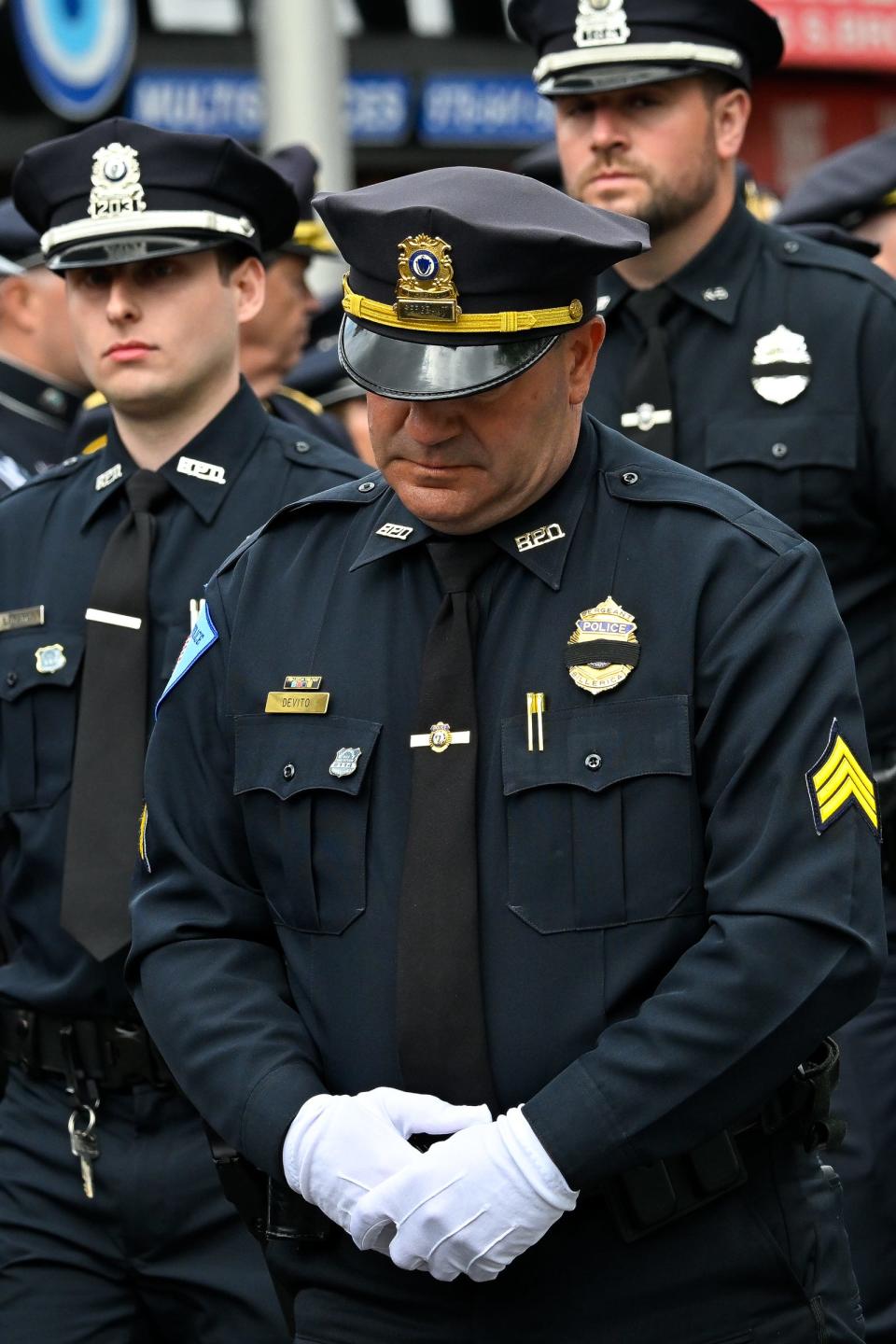
"Police protect this country. We support our officers now more than ever," Rep. Ralph Norman, R-Pennsylvania, said ahead of a House vote.
Republican Christopher DeCruze, 39, of Trumbull, Connecticut, believes the 2020 summer may have been “counterproductive.”
“Results of the protests – the general public outlook on police – caused, I think, an initial reaction that … led to an increase in crime,” DeCruze said.
More recently, leading up to the fourth anniversary of Floyd's murder, the Republican-controlled House flexed its law-and-order record during this month's National Police Week by passing several bills backing the blue.
GOP lawmakers won approval for legislation supportive of the police, including laws that require the quick arrest and deportation of any immigrant accused of assaulting a law enforcement officer; undermine changes the D.C. city council had made to sentencing rules and youth offender status; and require the Attorney General to submit a report on violent attacks against law enforcement officers.
"We're obviously trying to move legislation to support police officers and stand with cops," Rep. Chip Roy, R-Texas, told USA Today. "We stand firmly behind police."
Outside of Congress, Republicans on the ballot this fall are using as a wedge issue "defund the police" ? a slogan that became common among the political left during the Floyd protests, but which Democrats have long since abandoned.
Defund the Police policies have wreaked havoc on communities across the nation. That’s why, as governor, I fought back against this insanity and launched our first-in-the-nation Refund the Police Initiative.
This National Police Week, we pay tribute to the brave men and women… pic.twitter.com/HSfiq03XNN— Governor Larry Hogan (@GovLarryHogan) May 16, 2024
Other GOP officials who spoke with USA TODAY, however, said while their support for law enforcement is solid, additional reforms in terms of training and other procedures are worthwhile for Congress to pursue.
"We've always got to improve and by improving we'll instill more confidence in the general public. We need everybody to have an understanding that 96% of police are good people," Rep. Dan Meuser, R-Pennsylvania, told USA TODAY.
Meuser noted that Americans are more anxious about crime (which rose during the pandemic, though it has since fallen), with 63% describing it as either extremely or very serious, according to an October 2023 Gallup survey. He said rather than fueling trends that could worsen police-community bonds, policymakers should look to mend those relationships.
"I want kids to understand police are there to truly protect and serve," he said.
Pitting fear of crime against racial justice
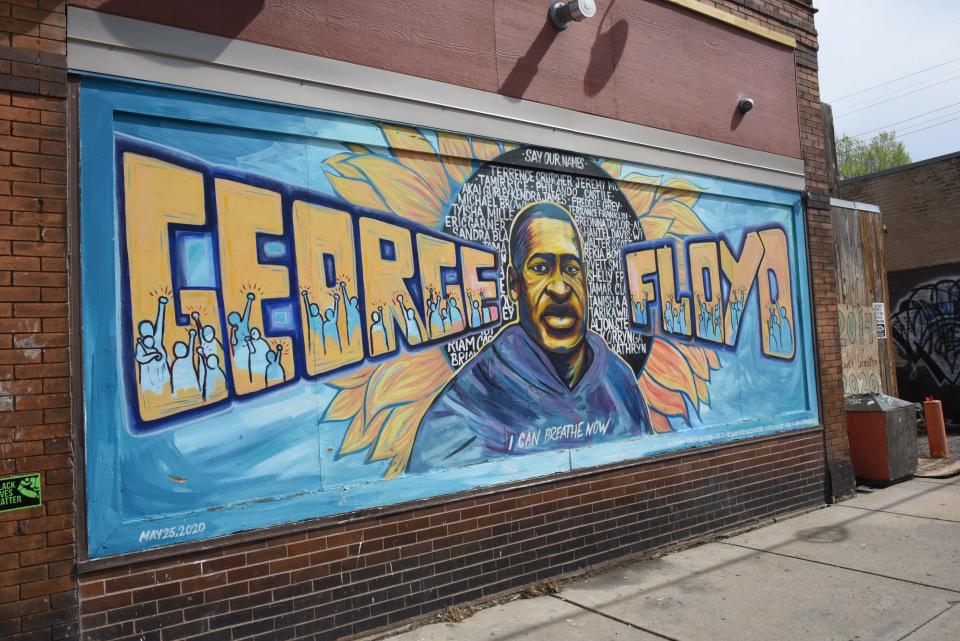
Hundred of miles from Congress in Minneapolis, the city where Floyd lived and ultimately perished, Rosemary Nevils Williams thought Floyd's murder would be a wake-up call for her hometown as well as the country.
She said enough hasn't been done to repair what has been broken between the city's Black and indigenous communities and law enforcement.
"It has to definitely change," she said. "It can't go on the way it is."
Despite recent falling crime rates in the city, Nevils Williams, a 75-year-old retired teacher and social worker, said seeking social justice means confronting the continuing bigotry and institutional barriers in areas like housing and education head on.
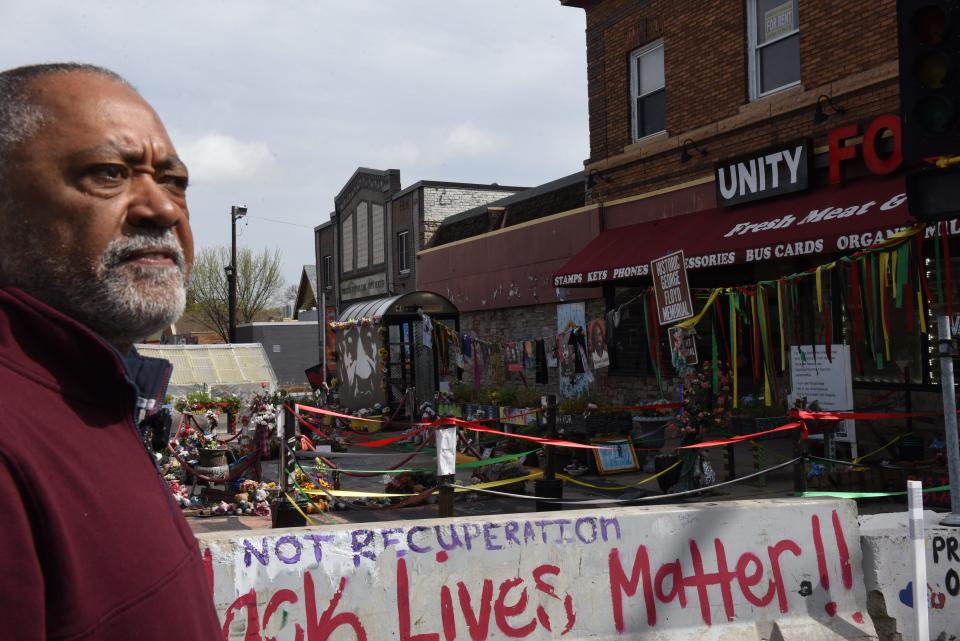
"The racism is still really profound, the killing of young Black men is just still overwhelming," Nevils Williams said. "Society feels like we’re almost back to the 60s."
In the years since Floyd's death, residents and activists said there is a growing sense that America's race relations have worsened across the board.
Dozens of states have adopted or proposed measures that critics say omit crucial parts of U.S. history. Some states have also banned books, many of them by Black authors that focus on race and/or sexual identity.
Proponents argue these books are offensive and that key parts of Black history are already taught in schools. Supporters of so-called "anti-woke" laws said such measures protect against teaching divisive issues and blaming current generations for past injustices such as slavery. Republicans have particularly attacked an academic framework known as critical race theory ? which argues that the legacy of slavery and racial discrimination continues to shape today's world ? calling it "woke indoctrination."
Further up the ladder of power, the Supreme Court eliminated affirmative action policies at major American colleges, which has spawned deeper concerns among progressives in education and others who fret this could embolden attacks on workplace diversity efforts.
Stephen Graves, an Oklahoma State University political science professor at the Center for Africana Studies, said it is notable that what he calls anti-Black measures are happening in a year that marks the anniversary of several civil rights milestones, such as the Brown v. Board of Education Supreme Court decision of 1954 and the Civil Rights Act of 1964.
He said opponents to those achievements have spent decades aiming their message at white resentment, which has fortified a powerful resistance to any racial justice movement.
"They have figured out the recipe," Graves said. "They still have enough pissed off, disenfranchised and uneducated white men in this country to where every time, every little semblance of Black progress, you name it, they automatically spin that into zero sum games: 'They're getting it, you're not getting it.'"
How Floyd's death shapes 2024 politics
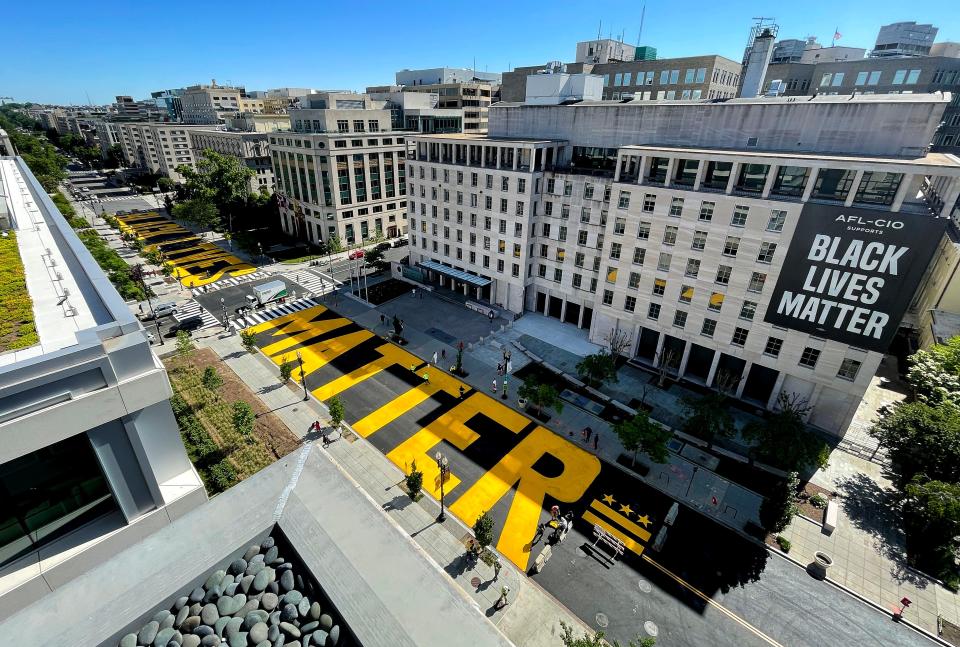
Accountability for law enforcement officers doesn't register as a top issue for Americans.
A March Gallup survey asked voters to rank issues by importance, and half or more said they worry "a great deal" about inflation, crime, homelessness, federal spending, the economy and the affordability of healthcare. Police reform didn't make the cut.
Race relations was a top priority with 35% of voters overall, the poll showed, and the same percentage of independents. That figure jumps to 47% among Democrats, but just 22% with Republicans.
Democrats have had a political tightrope to walk this election year.
In 2020, President Joe Biden featured Floyd’s sister in a campaign ad and was vocal about the prevalence of police brutality across the country.
At his State of the Union Address in 2022, however, the president took time to criticize the idea of cutting money for cops.
"Let’s not abandon our streets. Or choose between safety and equal justice," Biden said. "We should all agree: The answer is not to defund the police. The answer is to fund the police. Fund them with resources and training they need to protect our communities."
Grassroots organizers and their allies across the country tell USA TODAY the president's stance was to be expected, but there is much for them to be encouraged about.
They point out how several organizers have been pushing the ball forward with small victories at the local level.
Monifa Bandele is a chief adviser with MomsRising, a progressive-leaning grassroots organization that focuses on maternal justice issues.
She said while the response to the 2020 protests has been daunting, it is a sign of how powerful that movement was.
"The backlash is coming because such a clear threat has emerged to the status quo, to mass incarceration to mass criminalization,” Bandele said.
Between 2020 and 2022, for example, roughly 62% of the largest U.S. cities adopted some type of alternative public safety response program, according to the Brennan Center for Justice.
The center's research shows 25 states changed rules directly related to the circumstances of Floyd's murder, namely curtailing use of force, such as banning chokeholds, requiring officers to intervene in instances of police misconduct and forcing local agencies to report officer misconduct data to the state.
"On a local and state level, we've passed over 100 bills in George Floyd's name. So we have been having victories on every level except the federal level," Benjamin Crump, a nationally recognized civil rights attorney who has represented the Floyd family, told USA TODAY.
"It's those laws that give me hope, gives me optimism that we will give our children a better America going forward."
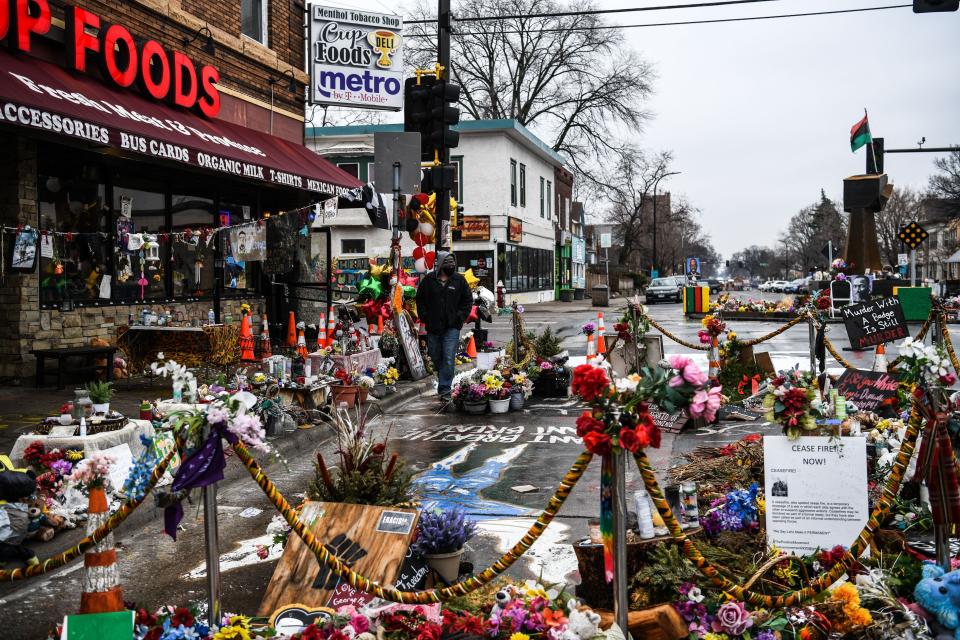
Others point to reforms in how cities respond to crime.
In Albuquerque, New Mexico, city leaders diverted roughly $17 million in police funding to establish a new community safety department.
The pilot initiative has reportedly taken more than 50,000 service requests, directly diverting about 33,000 calls from police since it launched in fall 2021, according to the Vera Institute, a national nonprofit aimed at ending mass incarceration.
Dozens of other cities have adopted "transform 911" programs that send unarmed civilian first responders to certain emergency calls. In 2022, for instance, officials in Dayton, Ohio, established a Mediation Response Unit that dispatches mediators to low emergency situations, such as barking dogs, neighbor disputes and child custody exchanges.
Organizers say residents seeing these alternatives taking root in their backyards can make it easier for voters to support a reimagining of public safety.
Polling conducted this year by GenForward, a center out of the University of Chicago, shows two-thirds of Black Americans favor exploring divesting from police and investing in some policing alternatives.
"You wouldn't have that before 2020,” Bandele said. “So this is a powerful, powerful moment. The backlash is because people's minds are changing and because people are having some very, very good experiments on the local level, which is where all this happens."
This is a powerful, powerful moment. The backlash is because people's minds are changing and because people are having some very, very good experiments on the local level, which is where all this happens.
Monifa Bandele
Movement veterans say the goal of changing American policing hasn't faded, but the emphasis has shifted.
Those frustrated with failed promises by elected leaders are focusing on electoral politics in 2024 while many more have flocked to join other grassroots movements, ranging from anti-gun violence campaigns to demanding reparations for slavery.
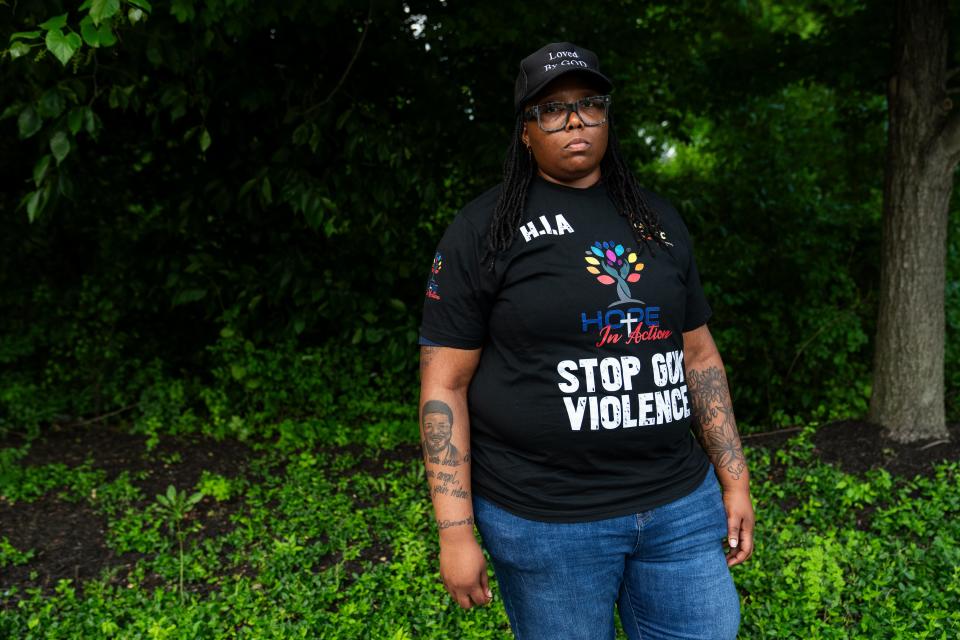
In Maryland, Tiffani Evans, 36, canvassed mostly Black neighborhoods ahead of the state's May 14 primary, urging people to vote.
Evans, who works for a nonprofit that aims to reduce gun violence, said she's seen some police reforms at the local level, pointing to Washington, D.C.'s no-chase law, which prevents unnecessary police car chases.
"We’re trying our best as mothers that’s lost our children to gun violence or police brutality to help change a lot of the laws," said Evans, whose son PJ was killed in 2021 when he was caught in crossfire.
In a bipartisan attempt to push reforms. Rep. Morgan McGarvey, D-Ky., Sen. Rand Paul, R-Ky., and Sen. Cory Booker, D-N.J., recently introduced a bill that would prohibit federal law enforcement and agencies that receive federal funding from executing no-knock warrants. The proposal is named in honor of Breonna Taylor, a Black woman killed in early 2020 by police officers in her Louisville, Kentucky, apartment.
Advocates dedicated to a national policy shift spawned by the Floyd protests said they don't want to give up hope either.
Crudup, the Minneapolis mom of six, believes with enough pressure, the country will pass something akin to the Floyd bill, but that it may sadly take more lives lost at the hands of police.
She noted the fatal shooting of 23-year-old Roger Fortson, an active-duty senior airman who was killed this month in his apartment by a Florida sheriff’s deputy while holding a firearm at his side.
“And he represented our country,” Crudup said.
“Maybe that shooting may reignite the issue (for the Floyd Act),” she added. “Heck, name all of the folks who police have killed since Floyd? I guess the sensationalism has waned much faster than most people probably thought it would.”
Savannah Kuchar contributed to this report.
This article originally appeared on USA TODAY: Racism was supposed to change after George Floyd. Backlash followed.
